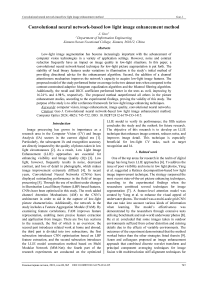Convolutional Neural Network-Based Low Light Image Enhancement Method
Автор: Guo J.
Журнал: Компьютерная оптика @computer-optics
Рубрика: Обработка изображений, распознавание образов
Статья в выпуске: 5 т.48, 2024 года.
Бесплатный доступ
Low-light image augmentation has become increasingly important with the advancement of computer vision technologies in a variety of application settings. However, noise and contrast reduction frequently have an impact on image quality in low-light situations. In this paper, a convolutional neural network-based technique for low-light picture augmentation is put forth. The stability of local binary features under variations in illumination is the study’s initial method of providing directional advice for the enhancement algorithm. Second, the addition of a channel attentiveness mechanism improves the network’s capacity to acquire low-light image features. The proposed model of the study performed better on average in the two dataset tests when compared to the contrast-constrained adaptive histogram equalization algorithm and the bilateral filtering algorithm. Additionally, the recall and DICE coefficient performed better in the tests as well, improving by 16.24 % and 4.98 %, respectively. The proposed method outperformed all others in the picture enhancement studies, according to the experimental findings, proving the validity of this study. The purpose of the study is to offer a reference framework for low-light image enhancing techniques.
Computer vision, image enhancement, image quality, convolutional neural networks.
Короткий адрес: https://sciup.org/140310372
IDR: 140310372 | DOI: 10.18287/2412-6179-CO-1415


